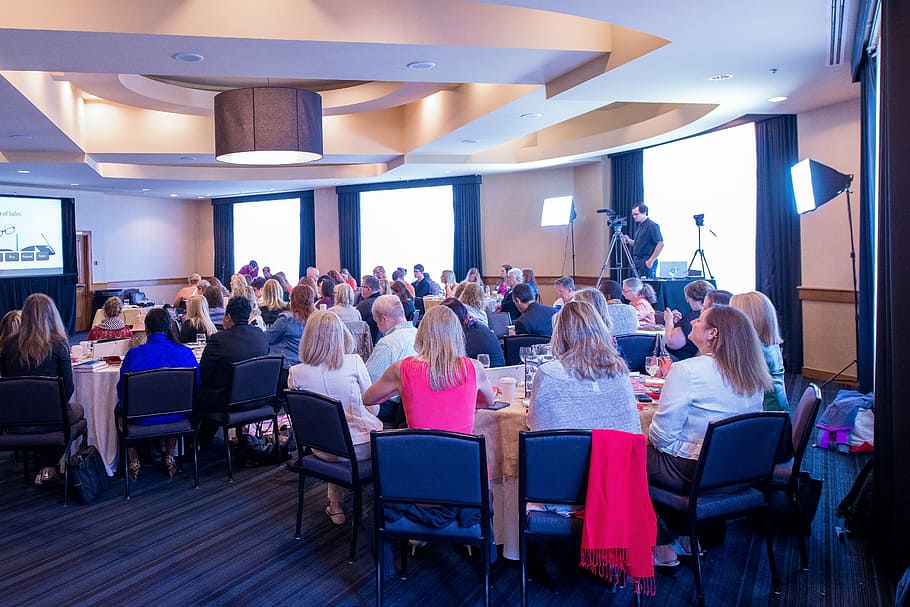Organizing a successful conference involves more than just booking a venue and inviting speakers. It requires strategic marketing to attract attendees, build anticipation, and ensure the event’s overall success. Whether you’re planning a professional industry conference, a niche summit, or an academic gathering, these 11 conference marketing tips will help you effectively promote your event:
1. Set Clear Goals and Objectives
Before diving into marketing tactics, define specific goals for your conference. Are you aiming to attract a certain number of attendees, generate leads for sponsors, or establish your conference as a thought leader in your industry? Understanding your objectives will guide your marketing strategy and help you measure success.
2. Know Your Target Audience
Identify your target audience based on demographics, interests, and professions. Tailor your messaging and promotional efforts to resonate with their needs and motivations. Consider what topics or speakers would appeal most to them and highlight these in your marketing materials.
3. Create Compelling Conference Branding
Develop a strong visual identity for your conference, including a logo, color scheme, and consistent design elements. Apply this branding across all marketing materials, including your website, social media profiles, email templates, and printed collateral. A cohesive brand image builds recognition and professionalism.
4. Build a User-Friendly Conference Website
Your conference website is a central hub for information and registration. Ensure it is easy to navigate, mobile-friendly, and optimized for conversions. Include key details such as agenda, speaker bios, venue directions, and registration links prominently displayed. Make it simple for attendees to find the information they need and register smoothly.
5. Utilize Social Media Strategically
Social media platforms are invaluable for promoting conferences. Create dedicated profiles or event pages on platforms like LinkedIn, Twitter, Facebook, and Instagram. Regularly post updates, speaker announcements, behind-the-scenes content, and relevant industry news. Engage with followers by responding to comments and encouraging sharing.
6. Implement Content Marketing
Produce informative and engaging content related to your conference theme or topics. This could include blog posts, articles, infographics, and videos featuring insights from speakers or industry experts. Share this content on your website, social media channels, and through email newsletters to attract and educate potential attendees.
7. Harness the Power of Email Marketing
Build and segment an email list of prospective attendees, sponsors, and industry influencers. Craft personalized emails with compelling subject lines and clear CTAs to encourage registration and engagement. Send regular updates, countdowns, exclusive offers, and reminders leading up to the conference.
8. Collaborate with Influencers and Partners
Partner with influencers, industry leaders, and relevant organizations who can amplify your conference’s reach. Invite them to speak, contribute content, or promote the event to their followers. Collaborative efforts can significantly expand your audience and enhance credibility within your industry.
9. Offer Early Bird Discounts and Incentives
Create urgency and incentivize early registrations by offering discounts, exclusive access to workshops, or special networking opportunities. Promote these offers prominently on your website, social media channels, and through targeted email campaigns to drive early ticket sales.
10. Utilize Paid Advertising Strategically
Allocate a budget for paid advertising campaigns on social media platforms (e.g., Facebook Ads, LinkedIn Ads) and search engines (e.g., Google Ads). Target your ads based on demographics, interests, and behaviors relevant to your target audience. Monitor performance metrics and adjust your campaigns to maximize ROI.
11. Engage Attendees Before, During, and After the Conference
Build excitement and foster community engagement before the conference through social media interactions, live Q&A sessions with speakers, and networking opportunities. During the event, encourage attendees to share their experiences on social media using event hashtags. Afterward, send thank-you emails, share post-event content, and solicit feedback to maintain relationships and encourage repeat attendance.
Implementing these conference marketing tips requires thoughtful planning, consistent execution, and a focus on delivering value to your attendees. By understanding your audience, leveraging digital platforms effectively, and fostering engagement throughout the event lifecycle, you can maximize attendance and ensure a memorable conference experience.




